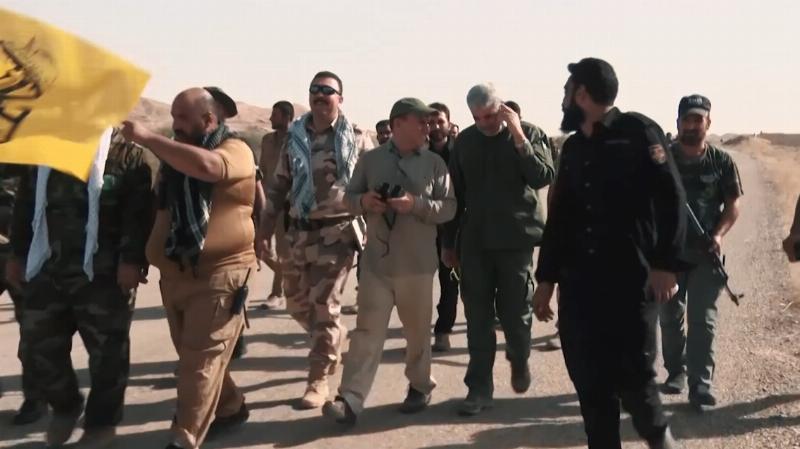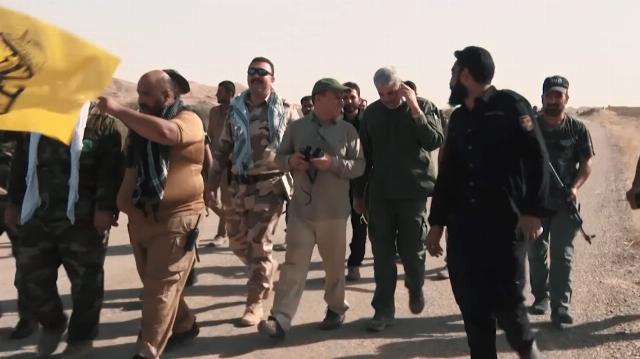


For almost two decades, Iraq was at the center of U.S. foreign policy, absorbing huge sums and costing thousands of American lives. Now, just a few years later, it risks fading into geopolitical obscurity—forgotten by the U.S. public and by policymakers as well. That would be a mistake.
Donald Trump built his brand on disrupting the status quo, whether in politics or foreign affairs. His first term saw major shifts in the Middle East, from the assassination of Iran’s Qassem Soleimani to the Abraham Accords between Israel and several Gulf and other Arab states. Now, he begins his second term with a clear inclination to shake things up again.
In that context, Iraq should be front and center. The government in Baghdad must be held accountable for harboring and legitimizing Iran-backed militias, the very forces that have destabilized the region for years.
As part of such a move, the regime in Iran would also be put in its place. For too long, Tehran has meddled in the affairs of Arab countries via a network of militias that it partly funds, supports, and occasionally directs. This so-called “Axis of Resistance” has suffered major blows in the past year because of the regional conflict sparked by the October 7 massacre in Israel by Iranian-backed Hamas.
Hamas is now badly degraded in Gaza. Hezbollah has been thrashed in Lebanon. Yemen’s Houthis, emboldened by Iran, face the real prospect of serious Western retaliation for their outrageous impeding of commercial traffic in the Red Sea. The Iran-backed Syrian dictatorship has collapsed.

Image: PMF commanders with IRGC advisors during the Hawija offensive (2017). Public domain.
The next station should be Iraq, which borders Iran and is thus a frontline state with global energy security impact. This country has effectively been hijacked by the often-overlooked Popular Mobilization Forces (PMF), a 235,000-strong militia network.
Unlike Hamas or Hezbollah, its component groups were once seen as something of an ally to the U.S., given their role in fighting ISIS in the previous decade. This allowed them to evade full scrutiny—enabling a process that leaves Iraq as a major hub of Iranian-backed terrorism, with the PMF as its enforcement arm.
But this is not just a case of limiting Iran’s reach. Iraq itself is playing an exasperating double game. The PMF has been allowed to establish a parallel power structure, officially sanctioned by the Iraqi state, which actually provides most of the PMF’s annual budget of $3 billion, even though the PMF operates under the control of Iran’s Islamic Revolutionary Guard Corps (IRGC).
Tehran itself also funds and directs some of the most powerful units within the PMF, including Asa’ib Ahl al-Haq, Kata’ib Hezbollah, and Harakat al-Nujaba, all of which have been involved in attacks on U.S. forces and allies. The IRGC’s Quds Force provides weapons, intelligence, and ideological training, turning these militias into an extension of Iran’s regional ambitions.
The militias have carried out systematic sectarian violence, war crimes, and attacks on U.S. forces—often with U.S.-made weapons and equipment that Iraq is providing to them.
In this way, “the U.S. is inadvertently subsidizing groups the U.S. itself has designated as terrorist organizations by providing funding to the Iraqi government, which then channels it to these militias,” says Kenneth Pollack, former CIA analyst and former director of the Persian Gulf Affairs at the National Security Council.
Groups like the Mahdi Army, Badr Organization, and Asaib Ahl al-Haq engaged in ethnic cleansing of Sunnis, operating death squads. Thousands of Sunnis were abducted, tortured, and executed, often found with drill holes in their bodies—a signature of militia interrogations. During the ISIS war (2014–2017), Shiite militias retaliated by committing massacres, forced disappearances, and torture against Sunni civilians, particularly in Tikrit, Fallujah, and Mosul.
At the same time, these militias have waged a long-running insurgency against U.S. forces, using explosives and rocket attacks to kill hundreds of American troops during the Iraq War (2003–2011). Even after the U.S. withdrawal, Kata’ib Hezbollah and Harakat al-Nujaba continued launching missile and drone strikes on U.S. bases, escalating after the 2020 killing of Soleimani and again during the Gaza war.
Since October 2023, Iran-backed militias have launched at least 160 attacks on U.S. forces. In January 2024, Kata’ib Hezbollah attacked a U.S. military base in Jordan, killing three American soldiers and injuring over 40 others. U.S. diplomatic missions in Iraq are also frequent targets. Since October 2023, these militias have also targeted Israel, launching suicide drones and missiles, though most have been intercepted.
That Baghdad has chosen to be sucked into this, says Michael Knights, senior fellow at the Washington Institute, means that “Iraq is a state sponsor of terrorism.” This is not a sovereign choice that must be respected; it is, rather, a case of weakness toward Iran and a reflection of the chaotic, sectarian, and corrupt way Iraq has handled its affairs.
The Biden administration failed to act decisively, relying on a combination of limited airstrikes and ineffectual diplomatic overtures to Baghdad. Basically, Iraq’s Shiite-led government feared Iran more. It has been a particularly galling reflection of American weakness and odd inability to maximize superpower leverage—precisely the sort of failure Trump claims he wants to reverse.
If Trump wants to solidify his legacy as the president who reshaped the Middle East, ending the power these Iran-backed militias have to threaten the lives of American personnel in Iraq is a must. If Iraq continues to harbor and empower these militias, it should face severe consequences. Designating Iraq as a state sponsor of terrorism would trigger a new round of U.S. sanctions, restricting trade, foreign aid, and military cooperation. The Iraqi economy would be devastated, and its international standing would be severely damaged.
The discussion should move from whether to disarm and dismantle the PMF to the following actions
• Political Pressure: The Iraqi government must be forced to choose: remain a U.S. partner or face the consequences of being designated a state sponsor of terrorism. While Prime Minister Mohammed Shia al-Sudani has expressed support for integrating some PMF units into Iraq’s official security forces, his government has lacked political will.
• Sanctions and Financial Warfare: The U.S. should escalate sanctions on Iranian-linked political and business figures in Iraq who finance the militias. This includes targeting PMF-controlled businesses, freezing their assets, and cutting off their revenue streams.
• Selective Military Action: While a full-scale military campaign is unlikely, precision strikes targeting PMF leadership and key military infrastructure could weaken their operational capacity. The U.S. has used this strategy effectively in Syria, and there is no reason it cannot be applied in Iraq.
• Splitting the PMF: Not all PMF factions are equally loyal to Iran. Some groups have nationalist leanings and could be integrated into the Iraqi security forces, isolating the Iranian-aligned elements.
• Regional Coordination: U.S. allies in the region, particularly Saudi Arabia and the UAE, have a vested interest in curbing Iran’s reach. Coordinating with them on intelligence, funding alternatives to Iranian-backed factions, and leveraging diplomatic channels could increase pressure on Baghdad.
The human cost of Iraq to America is staggering. Over 4,500 American service members lost their lives in the Iraq War, with tens of thousands more wounded—physically and emotionally. The war cost U.S. taxpayers over a trillion dollars, a massive financial burden that has not yet been fully accounted for. Yet, after all these sacrifices, Iraq is now a breeding ground for the same type of terrorism the U.S. sought to eliminate.
Trump’s legacy in the Middle East is already defined by bold, unconventional moves. Now, he has the opportunity to finish a job others started and then left strangely undone: dismantling Iran’s proxy empire, starting with these militias. Iraq’s tolerance of them has allowed terrorism to flourish on its soil, threatening both regional stability and U.S. interests.
The U.S. has the leverage to make this happen, but it must be used aggressively, without any hesitation. If Iraq continues to harbor and support these groups, it would be a devastating blow to the sacrifices made by America in that country.
Yassin Fawaz is the Chief Executive Officer of the Raddington Group, the pre-eminent global political risk and business intelligence firm. An accomplished American business executive, publisher, and expert in global security and terrorism, Yassin has established himself as a prominent figure in analyzing and navigating complex geopolitical landscapes.
